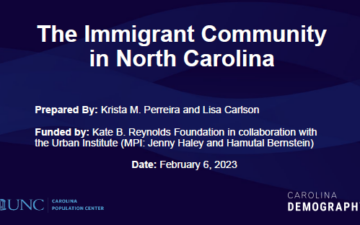NC urges delayed action on proposed metro standards

The following post is an email message we received from Bob Coats, Governor’s Census Liaison at the North Carolina Office of State Budget and Management, regarding the proposed changes to address how urban areas will be identified after the 2020 Census data are released and how metropolitan statistical areas will be defined. This email has been lightly edited and posted here with his approval. You can read what the recommendations are and how this will impact communities in North Carolina in our earlier post.
I posted earlier this year about Federal Register Notices concerning proposed changes to statistical and geographic criteria. These issues are now in the news. With a deadline approaching this Friday, I’m sharing background information and the response from the NC Office of State Budget and Management.
The Federal Register Notice from the US Office of Management and Budget with proposed Metropolitan Statistical Area (MSA) Criteria changes was posted in January. Another Federal Register Notice from the US Census Bureau with proposed changes to Urban Areas was posted about a month later. Both criteria changes are closely related.
If approved, the core (i.e. urban area core) for MSAs would be moved from 50,000 to 100,000. 144 current MSAs (over 250 counties) would be relegated from Metropolitan Statistical Areas to Micropolitan Statistical Areas. As the Notice states, OMB sees MSA standards and MSAs as being solely statistical entities. They do not consider funding implications in their recommendations. I was part of a virtual meeting last week with OMB and the chair of the technical working group who proposed the criteria changes. There has been plenty of feedback on the proposals, and OMB welcomes feedback through Federal Register Notice comments. OMB said they were not obligated to accept the working group recommendations.
I filed NC’s response (pdf) today, and I encourage anyone else with concerns on this issue to comment as well (submit comment here). The deadline is Friday 3/19.
Bob Coats
Need help understanding population change and its impacts on your community or business? Carolina Demography offers demographic research tailored to your needs.
Contact us today for a free initial consultation.
Contact UsCategories: Census 2020

The Center for Women’s Health Research (CWHR) at the University of North Carolina School of Medicine released the 12th edition of our North Carolina Women’s Health Report Card on May 9, 2022. This document is a progress report on the…

Dr. Krista Perreira is a health economist who studies disparities in health, education, and economic well-being. In collaboration with the Urban Institute, she recently co-led a study funded by the Kate B. Reynolds Foundation to study barriers to access to…

Our material helped the NC Local News Lab Fund better understand and then prioritize their funding to better serve existing and future grant recipients in North Carolina. The North Carolina Local News Lab Fund was established in 2017 to strengthen…
Your support is critical to our mission of measuring, understanding, and predicting population change and its impact. Donate to Carolina Demography today.